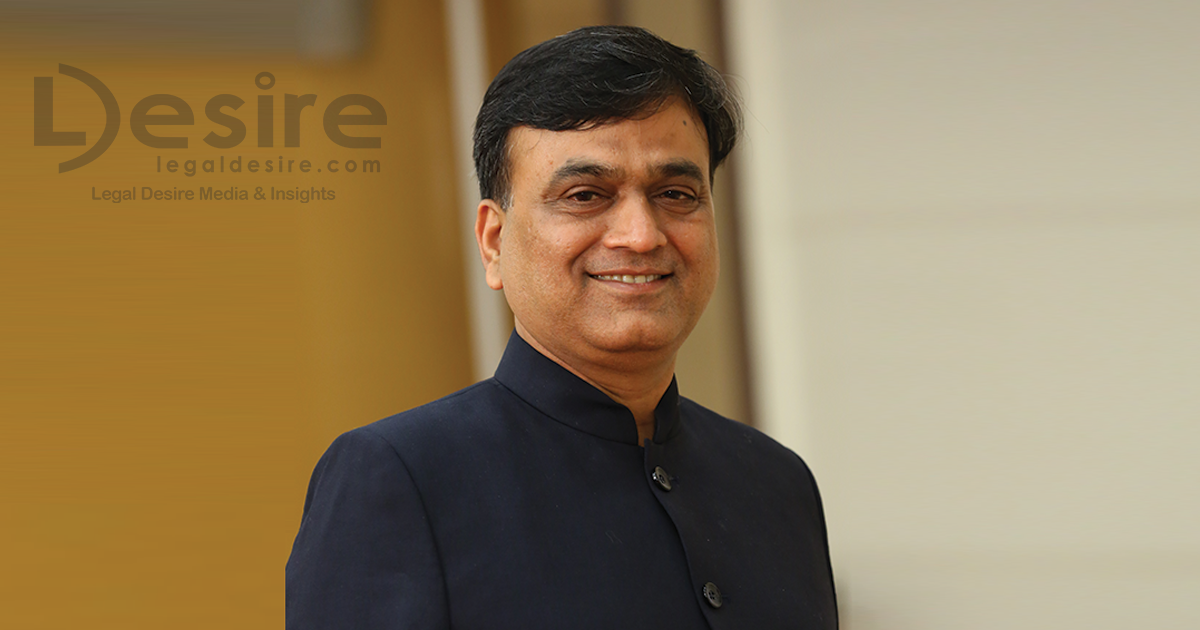Now Reading: In conversation with Kiran Jain, Founder at Regius Legal LLP
-
01
In conversation with Kiran Jain, Founder at Regius Legal LLP

In conversation with Kiran Jain, Founder at Regius Legal LLP
Starting your independent practice in 1991 from a small room at your residence with one Stenographer, to running a multi-practice law firm in the heart of Mumbai, life has come full circle. What were the key milestones or turning-points of your journey?
That’s a rather difficult question to begin with! There have been several professional turning-points of my journey, which not only gave me tremendous learning, but also strengthened my foothold in the profession. I still recall how my first successful matter (obtaining bail for an advocate alleged to have caused grievous hurt to an on duty police officer) lead to several matters being referred to me. In the same year, I happened to give certain strategic advice on transfer of movable properties to another advocate’s father. Little was I aware that it would pave way for my first 6 debt recovery cases where the properties of the debtors were attached. I became a ‘known’ and ‘trusted’ name in the money lenders’ circle. This was the initial stepping stone.
I was also fortunate to be a part of one of the first schemes where a slum rehabilitation project was presented in 1991-92, sanctioned in the year 1994-95 by the B.M.C. With completion of entire scheme in the year 1997-98, the defects in then slum rehabilitation scheme (SRD scheme) came to the fore and laid the foundation for the present Slum Rehabilitation Act and Scheme, under which today several projects are being sanctioned.
Right from several highly spoken-about cases like the one where High Court acquitted 5 persons held guilty for double-murder and sentenced to death penalty by the district court, to cases handling corporate litigation, arising out of malafide and criminal intention of a person to take over the corporate entity, the repertoire of work done by me has been very satisfying in terms of variety of work done and takeaways.
I also recall that in the year 2007-08, we handled a complicated litigation for builders, society, financers, tenants, slum dwellers, etc. This case involved multi-dimensional advisory and documentation for various parties involved in a redevelopment project. This one matter gave us 360 degree insights to various aspects relating to a redevelopment project, which later enabled us to do some path-breaking work in the real estate sector.
During the period of 2012-14, we augmented our presence as one-stop solution providers for all legal issues and matters pertaining to financial crimes. During this period, we handled 3 independent high-profile money laundering cases, 4 financial fraud cases & 2 whistle-blower cases which were widely covered across the media. With each matter varying significantly from the other, it was a challenge for us to brainstorm different approaches and litigation strategies for different clients, when most of these were not only filed overnight, but also saw rapid movement on the board. I call these cases highlights of my journey not only for the sheer time and effort we expended in bringing justice to our clients, but also because it amalgamated the aspects of civil and criminal laws. We had to draw strategies keeping in mind the nuances of civil laws relevant to the commercial aspects of a money-laundering case, and put all our learnings and experiences in criminal litigation to enable clients to take strategic decisions on next steps during the investigations and manoeuvring further proceedings.
In the last couple of years, we have been advising several public and private limited companies on strategic documentation, corporate advisory matters and commercial litigation matters. This is the period where our corporate practice has grown. I believe our confidence of having successfully dealt with both civil and criminal matters helps us guide the stakeholders and the upper-management in avoiding not only civil liabilities but also criminal liabilities.
You are a veteran in the art of conducting cross-examinations in civil and criminal trials have been an area of your expertise. According to you, what are the key factors to keep in mind while conducting a cross-examination?
Irrespective of whether you’re conducting cross-examination in civil or criminal matters, the following is worth keeping in mind:
- Always master the facts of the case. The tiniest detail or discrepancy is what sometimes changes the tide of a case. Simultaneously, mastery of the provisions of law applicable to facts of the case is also necessary.
- Carefully read the ‘examination in chief’ of the witness (and if applicable, the earlier witness as well). When you are asking questions to your witness, you must know which fact or point of law are you intending to prove using the answer of the witness to that question. You must know what you want to extract from your witness. Your target should be the answer and not the question.
- When you start the cross-examination of witness, begin by getting a firm idea of the facts the witness is aware about and the facts the witness is unaware about.
- Know more than the witness — more about the facts, more about the law, and, in the case of experts, more about the subject — at least for the period of time they testify. Think of it for instance: The psychiatrist has spent his life plunging into the questions of psychology and determined the mental health of patients but on the other hand is it possible for you to yield any material evidence from such an expert witness if you are unaware about the subject matter of psychology. Obviously, once the trial is over, all that you have gleaned from ‘Fundamentals of Psychology’ can be disgorged forever from your mind.
However, there are additional factors are vital to keep in mind when conducting a criminal cross-examination, for instance:
1. The entire burden in a criminal trial is upon the prosecution. A cross-examiner, during a criminal trial, is to cast doubts in the prosecution’s case. This can be accomplished by
- bringing before the court enough technical or scientific material in cross-examination to cause confusion and create doubt in the prosecution’s case;
- by focusing on bringing out the omissions / inconsistency / contradictions in the statements of witnesses and procedures; and
- by asking very limited and precise questions only.
2. Also, every prior statement of a witness may be fodder for incisive questioning. Failure to identify and thoroughly review these statements might mean a lost opportunity to expose testimonial inconsistencies or bias.
3. Distinguish between witnesses you want to destroy and those from whom you wish to elicit facts favourable to your client.
In any event, I would sum it up by saying that one must always remain the bulldog during the cross-examination. Never let the witness overpower you.
You’ve dealt with many high-profile money laundering and financial fraud cases, as well as cases related to conventional crime. How different has been your experience in handling money laundering and financial fraud cases?
A common mistake made by clients is to believe that the money laundering case is either purely a civil case or purely a criminal case. It must be realized that money laundering is a ‘unique case’ that obliterates the boundaries between civil and criminal law. Monies (proceeds) from a criminal offence is placed, layered and integrated through series of civil transactions, companies, entities and businesses (civil transactions). Hence, an exhaustive approach to deal with civil and criminal aspects of the case simultaneously and proactively is necessary to protect the client.
The cycle of money laundering has three steps: placement, layering, and integration. In our experience, the high-profile clients, who are ordinarily unknowingly involved into cycle, avoid to disclose in which step their role was involved. Since, another part of the legal strategy in also highly dependent on whether the client is involved in placement step, layering step or integration step, it is important to get the true facts upfront the clients against whom allegations of money laundering is made.
Unlike conventional crime, where you develop strategies and decide on next steps as the case progresses, legal strategy in money laundering cases is required to be framed on the first day itself. Challenge comes when clients underestimate the investigating agencies looking into the money laundering offence. The biggest mistake the clients have often made is failing to realize the consequences of the investigating agencies’ questions. Precautions, if any, are to be taken at the first step and hence legal strategy is required to be chalked out at the very beginning.
It is also important to understand the sensitivity of the allegations made against/on behalf of the client. We have realized that legal strategy is required to be based on whether these allegations are made against the client by a whistle blower or by way of red flags by a government agency/financial institution or by way of personal vendetta/agenda of a competitor/ business associates.
You have been one of the experts in debt recovery through summary suits and insolvency, what do you think is the impact of IBC on the debt recovery disputes?
Initiation of insolvency proceedings was always a good weapon in the arsenal in a debt-recovery dispute. However, the essence of it was somewhat lost because of the length of time it used to take to achieve the goal. The time-frame involved in having the debtor declared as insolvent was not only substantially long, but also cumbersome. Further, even after declaration of insolvency, the proceedings before the office of the Official Assignee used to take time.
Enactment of IBC and its further amendments have eased the issue to some extent. With NCLT coming into the play under the companies Act, the process of having the debtor declared as insolvent has definitely caught speed. The procedure for appointment of Interim-Resolution Professional has aided in reducing the time-frame substantially. This has made the threat of initiation of insolvency proceedings an excellent weapon in a debt-recovery dispute.
However, we still have a long way to go before this can be an effective means of recovery of debt. I say that for the following reasons:
- The code is applicable only to companies and LLPs, and this mechanism is still not made applicable to individuals, sole proprietor and partnership firms.
- The creditor must have documents to substantiate admission of debt.
- Despite admission of insolvency of the debtor, the amount that is actually possible to recover by the creditor will depend on a variety of factors which may not at all be in his control of one initiating the IBC process due to the control in the hands of the IRP and the CoC.
Whether a client with debt-recovery dispute should go to NCLT or not, is a question that requires detailed examination of facts by his lawyer. Only after study of all relevant facts and the reasonable estimate of the amount that can be recovered from initiating proceedings through the IBC route, a call should be taken on whether to knock the doors of NCLT or not. We have seen several cases where a client insists on proceeding with NCLT but has later repented its decision when it back-fires.
As part of growth initiatives, you recently moved your practice from a sole proprietorship structure to a partnership by on-boarding Mr. Ish Jain as a Senior Partner and forming Regius Legal LLP. How will Regius Legal LLP carry forward the legacy of your practice and what are the growth plans of the firm?
As a sole proprietor, I am happy to have grown my practice to a stage where I’ve never compromised on quality of work due to quantity. I’ve followed the golden rule that there is no room for our practice to have any ‘lapse’ or ‘oversight’, as it could cause dearly to the clients. Therefore, my practice had a steady and sustained growth. Ish and I have nurtured the collective vision to join hands and create an institutionalised and professionally-run platform which enables deserving professionals and best talent to join us in the near future. That explains the transition from sole proprietorship to partnership model in the form of Regius Legal LLP.
Regius Legal LLP carries forward my beliefs of dynamic, smart and speedy solutions as its core values. The firm has the capability to adapt itself to changing global trends, invests in developing skills and has foresight to identify potential red-flags and advice clients much in advance of their occurrence. As regard further growth plans, we shall be growing our reach within various cities abroad in the field of Litigation management & Transaction management. While we shall continue to grow our corporate practice, we have identified certain areas that are still at nascent stages and are evolving, like IBC, Crypto currencies, Project Financing disputes, E-commerce disputes, etc. and shall be making further inroads by deepening our work in this area. Besides this, Ish is also interested in growing the Aviation & Space law practice of the firm and we will actively be working in that direction.
How has your corporate practice drawn and benefitted from your vast experience in the dispute resolution practice?
Litigation or Dispute Resolution will always be the practice core to my heart, as I started my journey as a litigator and as you may have read by now, the journey has been very rewarding for me. My learning curve has been tremendous and I feel that I continue to learn till date, every day. I believe that the vast range of matters that we did for clients from diverse sectors such as real estate, retail, energy, oil and gas, hospitality, e-commerce, etc. equipped us with business and strategic knowledge.
Having represented clients in disputes, we were able to pre-empt the issue that may lead to disputes in future and hence our clients started involving us at the pre-litigation and strategic planning stages. This was the stepping stone for us to make greater in-roads in the field of corporate laws. Our clients increasingly started seeking our advice to help them understand and assess their options and execute their most complex transactions. Our well-rounded advice, which provided for convergence of industry/commercial awareness with legal knowledge, added value to business decisions of our clients and that gave us a strong foothold in the corporate practice.
Another important factor, as highlighted above, was our confidence of having successfully dealt with both civil and criminal matters. It helped us guide the promoters, directors, shareholders and C-Suite Executives on avoiding not only civil liabilities but also criminal liabilities. Today, we represent businesses and entrepreneurs from diversified sectors of the business community and hand-hold them in issues related to transactions, real estate, shareholders disputes, directors’ and officers’ liability, debt collections, fraud, procurement claims or project financing disputes.
You have more than three decades of experience and you’ve witnessed the changing legal landscape in our country. How has the legal sector changed in last three decades?
As we always say, change is the only permanent thing in life! Every profession goes through evolution with passage of time and legal profession has not been alien to this. Prior to 1990s, the nature of profession was mostly pertaining advocacy and solicitors’ working. In 1991, when the economy was liberalised and we opened the gates to foreign entities to invest in the country, we saw the dawn of corporate legal sector. For a lot of lawyers this also opened the options of a new dimension in terms of rendering services in the form of legal advice in the corporate/commercial sector. Apart from bar and bench, we started having lawyers practicing in the corporate sector. A field that was mostly preferred by second and third generation lawyers became a viable career option for several first generation lawyers. Setting up of National Law Schools in the 1980s-1990s and several private law schools in the 2000s led to more and more students opting for law as a career choice. Today, while we have a huge supply of law graduates, the quality of legal education is not up to the mark in terms of equipping my young friends with practical skills-set required for them to excel in the profession. Our legal education system is still academics-oriented and lacks the practical exposure that every law student must be equipped with.
Another significant change I notice is the widespread use of technology in the day to day functioning of the lawyers and judicial system. I recall that in my formative years, I used to meticulously make notes for every matter and my briefs were always flagged and highlighted. Our research meant sifting through scores of papers, books and commentaries. We did not have the search options at the click of a button. It made us more methodical, hard-working, patient and thorough with what we put forth in our drafts. Paper, until recently, used to be a comfort factor.
Today, when operations are being digitized, there is no doubt saving of paper, weight, storage space and bulk in terms of physical files. Search engines and software give you good starting points for conducting researches and there are better resources at the disposal of today’s generation. The courts are also going virtual, with hearings being scheduled through means like video-conferencing. There is no doubt that technology eases functioning, but I’m not sure of effectiveness of means like virtual hearings, especially when it comes to several aspects of the Court proceedings. What a lawyer could achieve through physical presence in the Courtroom would be half as effective in a virtual courtroom.
I am sure our legal system would understand these nuances and will take ‘furtherance of justice’ into consideration before forming further guidelines in this regard. I also feel that young lawyers should make use of technology to aid them with operational aspects in terms of access to information and ease of knowledge exchange. But they shouldn’t use it as a short-cut to avoid hard work on reading and research.
What would be your advice to our young readers?
My only and most important piece of advice for my young friends would be to always be prepared while entering the courtroom, conference or client meeting. Law is a sort of ‘applied science’, it does not hold much significance in isolation. If you’re not well-versed with the facts or haven’t read the case papers, what would you apply your legal knowledge to? Reading of files and papers gives you a different sort of confidence and the application of your legal learning to practical real-life situation becomes meaningful. There is no substitute for reading and being thorough with facts. There is nothing ‘cool’ about flaunting that you succeeded in a case without reading the file. Professional life is far too less about ‘winning and losing’ and way too more about ‘learning and growing’!
Send your feedbacks to office@legaldesire.com











Dr. Hassan Elhais
This interview sheds light on his expertise and passion for the legal field. A must-read for aspiring lawyers and entrepreneurs.